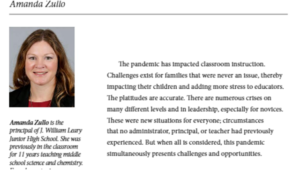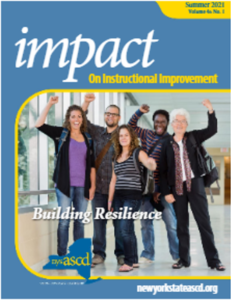Starting with Communication: Lessons for Leaders from Positive Outlier Schools
By Amanda Zullo
Within each stage of NYKids research, the role of communication from the building and district leadership has been analyzed. Communication has been noted as influencing educators’ levels of stress and job satisfaction along with educators’ willingness and ability to adapt to change in positive and innovative ways.
The Need to Communicate
 In a deep analysis of focus groups from two positive outlier schools, organizational features such as administrative communication and administrative support bolster educators’ actions to support children. Almost every educator engaged in focus groups across two positive outlier schools mentioned the role their administrators played in helping them to meet the needs of children. Educators noted specific actions such as lending a hand in classrooms or providing resources for activities as actions administrators engaged in to demonstrate support. Educators also noted how that administrative support influenced their perceptions of children and the actions they engaged in to support children. A quote from one educator sums up the positive outlier school’s culture:
In a deep analysis of focus groups from two positive outlier schools, organizational features such as administrative communication and administrative support bolster educators’ actions to support children. Almost every educator engaged in focus groups across two positive outlier schools mentioned the role their administrators played in helping them to meet the needs of children. Educators noted specific actions such as lending a hand in classrooms or providing resources for activities as actions administrators engaged in to demonstrate support. Educators also noted how that administrative support influenced their perceptions of children and the actions they engaged in to support children. A quote from one educator sums up the positive outlier school’s culture:
This building is the heartbeat of the community, and it is family and kids first. Every student knows that. When you walk into this building, I’m sure you felt it. It feels different than most buildings. Our administration can walk into our classroom at any given time, and the students perform as they always would perform. It is not a distraction but a welcome presence. From the custodial staff to the bus drivers to the secretarial staff to the cafeteria people to the educators, we all put the kids first, and they know we love them very much.
 Building on Research in Positive Outliers
Building on Research in Positive Outliers
As I entered a new role as building principal, I was studying best practices in positive outlier schools, and I was aware of what I should do. With many years of experience behind me, I was also apprehensive as some things are easier said than done. From my own experience coupled with the NYKids research on positive outlier schools, it was evident that educators obtain a stronger sense of purpose based on the administrative support available to them amidst ongoing adjustments and adaptations.
Laying out the purpose and my own expectations were easy: “My #1 goal is that my work supports your work” was a phrase I used in the first faculty meeting in my first hour of work on my first day. As that day now seems so far away, I continue to be conscious of how I am supporting educators in the building and the broader school community.
As outlined in this article, Looking Forward, I continued and created several key items. From Monday Morning Emails to Daily Check-in’s, I engage every staff and every student every day. I created four groups that guide my work. On top of the formed groups, I continue to make it a point to regularly communicate and engage staff in discussions. Last year, that occurred through department meetings; this year professional learning communities/collaborative conversations take place every other day during the six-day cycle.
 I also sustain regular ongoing conversations with children and their families. I have found children and families to be a great resource for information and insight into how well the school is supporting their child. The conversations center around in-person discussions with children during advisory and lunch. Weekly, I send families an update and make it a point to call home for as many positive things as I do negative ones.
I also sustain regular ongoing conversations with children and their families. I have found children and families to be a great resource for information and insight into how well the school is supporting their child. The conversations center around in-person discussions with children during advisory and lunch. Weekly, I send families an update and make it a point to call home for as many positive things as I do negative ones.
As I continue to work with staff and students on how unique this time in public education is, I also remind myself that there is no time like the present to build towards the future. While the road may be challenging, we are surrounded by hope and demonstrations of resilience. Together we will get through this, and in the process we will lay a valuable foundation for students and teachers to work from in the future.
For more detail from Amanda’s article see the Impact journal from NYSASCD and also check out NYKids other research reports and articles on leadership at our research results page.
Tag:communication, engagement, growth
